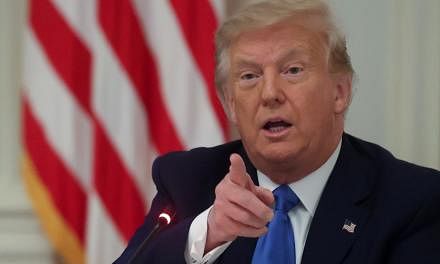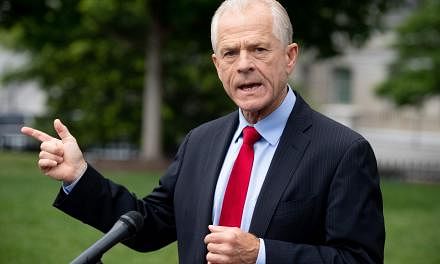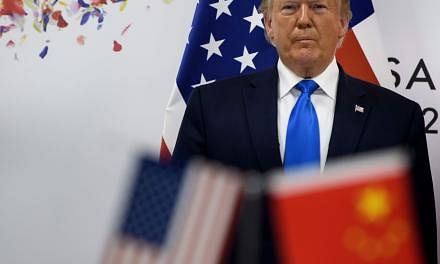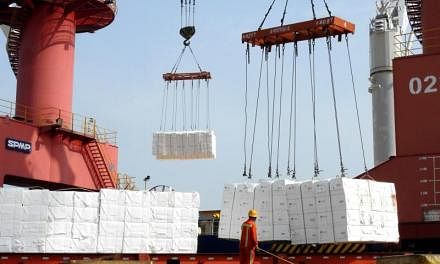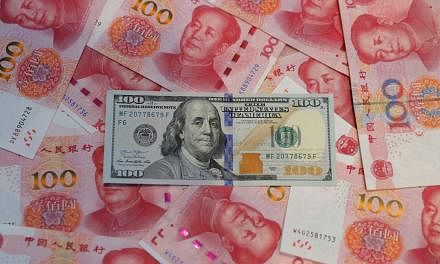WASHINGTON - In a tit-for-tat trade war, China will run out of targets for tariffs sooner than the United States will, US Commerce Secretary Wilbur Ross said on Monday (May 14).
Striking a defiant note ahead of a second round of high level negotiations this week with Chinese deputy premier Mr Liu He, Mr Ross said in a speech at the National Press Club: "I hope we can make a fair deal but if it doesn't happen, a trade tit-for -tat will not be economically life threatening to the United States."
"It's difficult to handicap the outcome (of the talks)," Mr Ross said, but he added that his hope was the strong personal relationship between President Donald Trump and China's President Xi Jinping will "facilitate an agreement just as it seems possibly to be doomed".
Mr Liu will reportedly fly to Washington on Tuesday (May 15).
An earlier round of meetings in Beijing with Mr Trump's top economic team including Mr Ross, was inconclusive, with a wide gap remaining between the two sides.
The United States' goods trade deficit with China rose to US$375 billion (S$501 billion) last year. The US has demanded a US$200 billion reduction.
Since Mr Trump took office in January 2017, Washington has slapped tariffs on steel, aluminium and solar panels, aimed chiefly at China - and has threatened more if China does not reform.
Among the US demands are an end to Chinese government subsidies to key industries; an end to forced joint ventures and technology transfer for US companies operating in China; and an end to theft of intellectual property rights.
China has threatened to retaliate, but Mr Ross shrugged that off.
"If China retaliated with a 25 per cent tariff on US$50 billion of our exports as threatened, we will lose a major fraction of that value but not all," he maintained.
Even a full US$50 billion hit to US exports to China would be "painful to the direct targets but would have less than 3/10 of 1 per cent impact on our US$18 trillion economy and it would be partly offset by reduced imports of goods," Mr Ross said
"The inflationary effects would be even more muted - one quarter of one per cent of our economy."
"China sells us far more than we sell them; given the lopsided balance they will run out of targets for tariffs much sooner than we would. Also their retaliation will negatively affect their own economy as well as ours. This will be particularly true of agricultural products, they cannot feed themselves so they must import to fill the gap.
"In 21 of 23 major product categories, China's tariffs are far higher than ours," he said.
"A similar chart for Europe would show almost the same disparity. They both are far higher than the US. This is not comparative advantage, this is protectionism."
"The US is the most open and most exploited market in the world," he insisted. "Both China and Europe eloquently espouse free trade rhetoric but in actual practice are far more protectionist that the United States."
"Our most favoured nation (MFN) tariff on passenger cars is 2.5 per cent, we are stuck with it," Mr Ross said.
"Europe's tariff is 10 per cent, China's is at 25 per cent. Efforts over the last decade and a half to negotiate broad changes to these tariff rates have failed in large part because of China's unwillingness to make concessions commensurate with its significant role in the global economy. This is not fair trade, this is not free trade.
"Our trade policy's main objective is to make their real world behaviour match their free trade speeches. The second objective is to have our trading partners abide by the rules. But they have not."
Mr Ross also served notice on seafood exporters to the United States. More than 80 per cent of seafood consumed in the US was imported, he said. This was "silly" he said, adding that "we want to change that deficit into a surplus".
Post World War II, the US had made systematic trade concessions to which it remained bound. But concessions made to China or Europe that might have been correct 50 years ago were no longer appropriate today, he said.
Meanwhile, President Trump in a tweet on Sunday indicated some willingness to reconsider an earlier ban on Chinese tech company ZTE, introducing a new element into this week's talks.
Last month, the Commerce Department blocked American firms from selling parts or providing services to ZTE, which makes smartphones and other telecom equipment, saying the Chinese company had violated a deal in which it had agreed to pay a US$1.2 billion fine for evading US sanctions on Iran and North Korea.
On Sunday night, Mr Trump tweeted: "President Xi of China, and I, are working together to give massive Chinese phone company, ZTE, a way to get back into business, fast. Too many jobs in China lost. Commerce Department has been instructed to get it done!"
But Mr Ross skirted the issue.
"Our position is (the ZTE case) is an enforcement action, separate from trade," he said.



